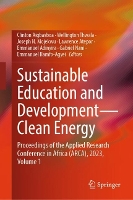


|
|
|
books
| book details |
Sustainable Education and Development—Clean Energy: Proceedings of the Applied Research Conference in Africa (ARCA), 2023, Volume 1
Edited by Clinton Aigbavboa, Edited by Wellington Thwala, Edited by Joseph N. Mojekwu, Edited by Lawrence Atepor, Edited by Emmanuel Adinyira, Edited by Gabriel Nani, Edited by Emmanuel Bamfo-Agyei

|
| on special |
normal price: R 12 656.95
Price: R 11 391.95
|
| book description |
This book is Volume 1 of the proceedings of 2023 Sustainable Education and Development Research Conference. This volume concentrates on papers in the area of clean energy. Despite considerable progress, more than 700 million people worldwide still lack access to electricity, and around 2.4 billion people continue to use harmful and polluting fuels for cooking. While efforts have been made to promote renewable energy and energy efficiency, they have not been fast enough to achieve Sustainable Development Goal 7. Adding to the challenge, the ongoing war in Ukraine has contributed to rising global energy prices and heightened energy insecurity in Europe. In response to the energy crisis, some European countries are planning to accelerate the transition to renewables and increase investments in clean energy and energy efficiency. However, others are considering a resurgence of coal, which poses a risk to the overall green transition. Between 2010 and 2020, the percentage of the global population with access to electricity increased from 83% to 91%, with 1.3 billion people gaining access. Nevertheless, this leaves approximately 733 million people still without electricity, and most of them reside in sub-Saharan Africa. Achieving universal access by 2030, the annual growth rate in access needs to accelerate from 0.5 percentage points to 0.9 percentage points, necessitating significant efforts in low-income, fragile, and conflict-affected countries. In 2020, 69% of the global population had access to clean cooking fuels and technologies. While more than half of those without access to clean cooking fuels live in Asia, the 20 countries with the lowest percentage of people having access to clean cooking were predominantly least developed countries in Africa. The share of renewable sources in total final energy consumption reached 17.7% globally in 2019, just slightly higher than the figure for 2015. The electricity sector leads in the adoption of renewables, accounting for 26.2% of total final energy consumption in 2019, while the heat and transport sectors have made limited progress. Global primary energy intensity, defined as global total energy supply per unit of GDP, improved from 5.6 megajoules per dollar (2017 purchasing power parity) in 2010 to 4.7 megajoules in 2019. However, the rate of improvement (1.6% per year on average since 2015) falls short of the 3.2% annual rate needed to reach Sustainable Development Goal 7.3. International financial flows to support clean and renewable energy in developing countries reached $10.9 billion in 2019, a 23.6% decrease from 2018. This decline occurred even before the onset of the COVID-19 pandemic. Over a longer five-year moving average, average annual commitments decreased for the first time since 2008, from $17.5 billion in 2014-18 to $16.6 billion in 2015-19. Although developing countries achieved a record of 245.7 watts per capita in installed renewable energy-generating capacity in 2020, small island developing States, least developed countries, and landlocked developing countries have lagged behind. It would take least developed countries and landlocked developing countries nearly 40 years and small island developing States almost 15 years to reach the same level of progress as the average developing country in 2020. The 2023 SEDRC conference, titled ""Sustainable Development and Education,"" aims to redefine the understanding of research in the continent's development and the role of researchers. The conference focusses on applied research discussions and its dissemination. Researchers from research institutions, academicians, postgraduate students, politicians, and industry representatives will be the primary audience for the conference proceedings.
| product details |

Normally shipped |
Publisher | Springer International Publishing AG
Published date | 8 Feb 2025
Language |
Format | Hardback
Pages | 918
Dimensions | 235 x 155 x 0mm (L x W x H)
Weight | 0g
ISBN | 978-3-0316-5356-8
Readership Age |
BISAC |
| other options |
|
|
|
To view the items in your trolley please sign in.
| sign in |
|
|
|
| specials |
|
|
Let's stare the future down and, instead of fearing AI, become solutionists.
|
This first comprehensive biography of Cecil Rhodes in a generation illuminates Rhodes’s vision for the expansion of imperialism in southern Africa, connecting politics and industry to internal development, and examines how this fueled a lasting, white-dominated colonial society.
|
|
|
|
|